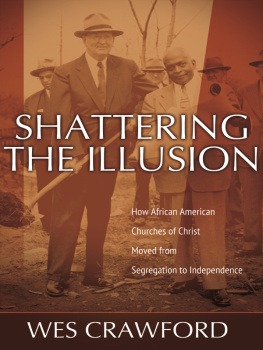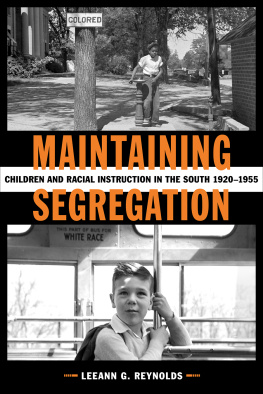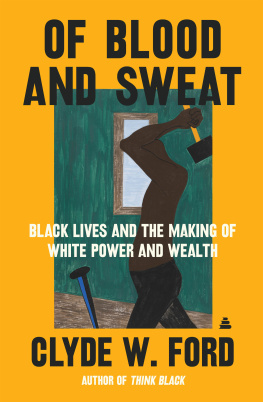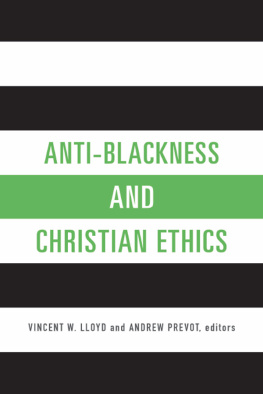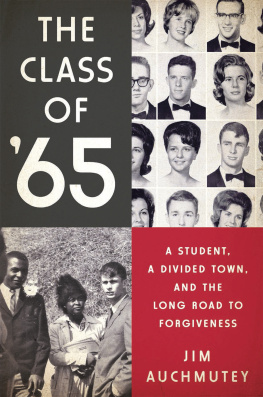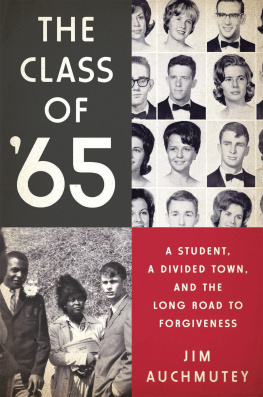Contents
Guide
Pagebreaks of the print version
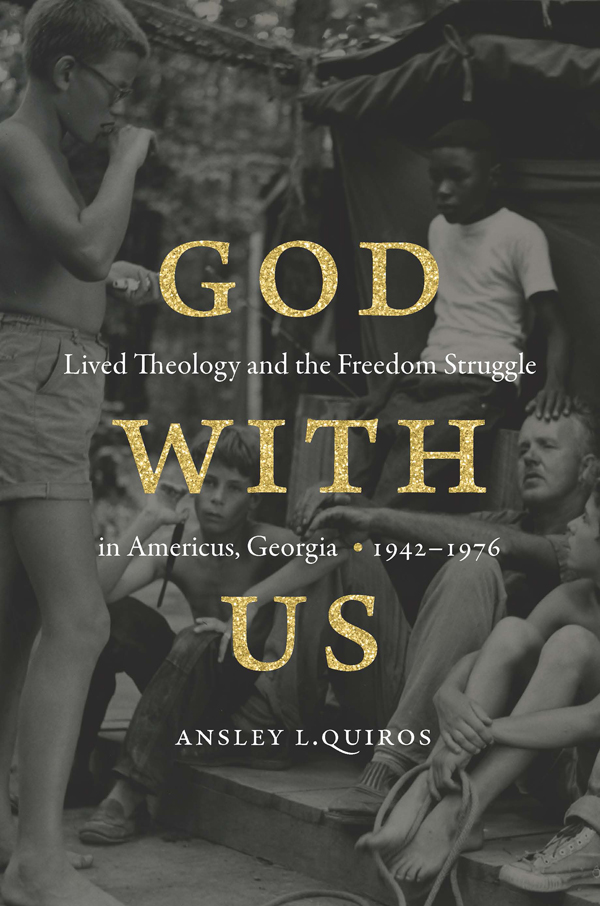
God with Us
ANSLEY L. QUIROS
God with Us
Lived Theology and the Freedom Struggle in Americus, Georgia, 19421976
The University of North Carolina Press Chapel Hill
This book was published with the assistance of the Authors Fund of the University of North Carolina Press.
2018 The University of North Carolina Press
All rights reserved
Set in Arno Pro by Westchester Publishing Services
Manufactured in the United States of America
The University of North Carolina Press has been a member of the Green Press Initiative since 2003.
Library of Congress Cataloging-in-Publication Data
Names: Quiros, Ansley Lillian, author.
Title: God with us : lived theology and the freedom struggle in Americus, Georgia, 19421976 / Ansley L. Quiros.
Description: Chapel Hill : University of North Carolina Press, [2018] | Includes bibliographical references and index.
Identifiers: LCCN 2018016975 | ISBN 9781469646756 (cloth : alk. paper) | ISBN 9781469646763 (pbk : alk. paper) | ISBN 9781469646770 (ebook)
Subjects: LCSH : Civil rights movementsGeorgiaAmericusHistory20th century. | African AmericansCivil rightsGeorgiaAmericusHistory20th century. | Religion and sociologySouthern States. | Americus (Ga.)Religion20th century. | Americus (Ga.)Race relations.
Classification: LCC F 294. A 5 Q 5 2018 | DDC 323.1196/0730758913dc23 LC record available at https://lccn.loc.gov/2018016975
Cover illustration: Ida Bermans Koinonia Farm Camp at Highlander (Koinonia Farm Photographs, Hargrett Rare Book and Manuscript Library, University of Georgia Libraries; used by permission of Karen Berman).
A version of chapter 5 was previously published as The Road to Charlottesville Runs through Americus, Georgia, The Activist History Review (October 2017), https://activisthistory.com/2017/10/06/the-road-to-charlottesville-runs-through-americus-georgia/. Used here with permission.
For Amanda Paul Miller Privette, and Marilyn Miller Privette Quiros, and all those who long for justice in the South
Contents
Illustrations and Map
ILLUSTRATIONS
MAP
Acknowledgments
Among the many things I have learned in writing this book is the common grace of generosity. So many have helped along the way, sharing documents, expertise, insight, and time. To yall, I offer my sincerest thanks.
Many institutions and communities of scholars have supported and sustained this work over the years. Thank you to all at Furman University who fostered a love of history, especially Tim Fehler, Savita Nair, David Shi, Courtney Tollison, and Dianne Vecchio. Early stages of the work were presented at conferences at Drew University, Emory University, the University of Memphis, and the Association for the Study of African American History and Life, where conversations and questions improved it mightily. Librarians and archivists at the National Southern Baptist Archive in Nashville, the Pitts Library and Rose Library at Emory University, the Hargrett Library at the University of Georgia, and the Jimmy Carter Presidential Library in Atlanta also helped along the way, and they deserve recognition for their work in cataloguing the past. I have found historians of the South, wherever they may be found, particularly collegial and helpful, notably, Jim Auchmutey, Ed Blum, Joe Crespino, Bob Elder, Paul Harvey, and Hank Klibanoff. Steve Hayness ecclesiastical repentance group brought together thoughtful, supportive laypeople and scholars interested in race and religion. Participating in this group, and meeting Anthony Bradley, Carolyn Dupont, Dalton Lyon, and Joe Reiff, proved to be an unmitigated blessing.
Special thanks go to Vanderbilt University for offering me an unmatched intellectual community. To Jessica Burch, Will Bishop, Courtney Campbell, Jon Hansen, Miriam Martin, Erin Woodruff Stone, Lu Sun, Amy Gant Tan, Nick Villanueva, and especially Matt Owen and Frances Kolb Turnbell: you were delightful companions, academic and otherwise. Presenting this work at the History Departments Americanist Seminar and in other workshops was invaluable in honing the argument and refining the prose. A year at the Robert Penn Warren Center for the Humanities, run by the indomitable Mona Frederick, provided needed time to write as well as a superb set of readers: Emily August, Whitney Laster, Aoife Laughlin, John Maddox, Paul Morrow, Aubrey Porterfield, and Jamie Shenton. Thank you to the Vanderbilt History Departmentnamely, Michael Bess, Bill Caferro, Jim Epstein, and Jane Landers, each of whom offered me consistent encouragement and good humor. My heartfelt appreciation, too, to Paul Kramer, whose keen eye reshaped the project at a key moment; to Sarah Igo, for her constant editing and advocacy; and to Dennis Dickerson, who shepherded the project with enthusiasm and expertise from the very beginning. Thanks as well to Charles Marsh, for reading this work and championing it, and to Karen, for making sure Charles got my emails. My profoundest gratitude belongs to Gary Gerstle. He read countless drafts of this work, and his ruthless blue pen improved it immeasurably. As a mentor and historian, he is unrivaled.
Over the course of writing this book, life and work have taken me on a veritable tour of the Deep South, from South Carolina to Tennessee, and always, to Georgia. My most recent stop has been to the University of North Alabama, where I have found energetic teachers, a community of scholars, and a home. My colleagues in the History Department have been readers, mentors, and friends, and I thank you all. Thanks, too, to the College of Arts and Sciences, which, in the form of its Research Award, offered critical support for the project in its final stages. My students at UNA have been, quite unexpectedly, the books most enthusiastic backers, reminding me that the stories of race and religion in the American South are worth telling.
It has been a distinct privilege to work with the University of North Carolina Press, particularly Brandon Proia, Jad Adkins, Cate Hodorowicz, and Dino Battista. Thank you all for your thorough work and support without which there would be no book. Thank you, too, to the anonymous reviewers whose careful readings sharpened the analysis and enriched the narrative. I remember someone telling me once that Brandon Proia was the best editor out there. Now I know why. Brandon, your keen edits enhanced the book tremendously, and your good humor sustained me throughout. Thank you.
Though this story of Americus is one of conflict and struggle, what I found in my time there was nothing but kindness, openness, and support. Karl Wilson was my first friend and most ardent supporter; he made introductions for me and continued to mail me newspaper clips for years. Alan Anderson knows more about Americus than anyone and generously shared his wisdom with me. Sam Mahone has worked tirelessly to tell the story of the Americus and Sumter County Movement and has been a constant friend. Outside of town, the saints at Koinonia Farm continue their tradition of offering respite and insight. Thank you to Bren Dubay, Amanda Moore, and Bill Harris, Jr., for welcoming me to the farm and letting me see your archive. Thanks also to the many churches in Americus that shared their histories with me, especially First Baptist, First Presbyterian, Bethesda Baptist, Campbell Chapel A.M.E., and especially First United Methodistand Jan Bird and Lyn Dozier in particular. Bill and Ann Harris are the epitome of hospitality, providing me a real home in Americus and welcoming me into their lovely family. Charles and Shirley Sherrod also deserve my deepest gratitude, for everything. Finally, to all those in Americus who opened their homes and shared their storiesoften through tears, on couches, at kitchen tables over coffee, on porches with dogs underfootthank you. Your willingness to tell the truth about even the difficult times gives me hope for the South yet.



